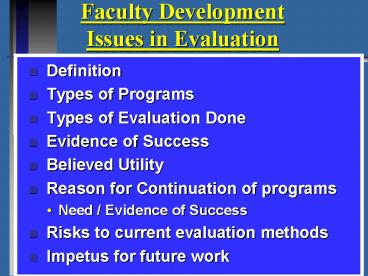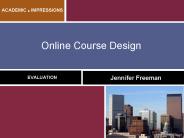Faculty Development Issues in Evaluation - PowerPoint PPT Presentation
1 / 27
Title:
Faculty Development Issues in Evaluation
Description:
activities designed to improve an individual's knowledge and ... Content Areas, e.g., End of Life, Geriatrics, Organizational Leadership, Professional Skills ... – PowerPoint PPT presentation
Number of Views:16
Avg rating:3.0/5.0
Title: Faculty Development Issues in Evaluation
1
Faculty Development Issues in Evaluation
- Definition
- Types of Programs
- Types of Evaluation Done
- Evidence of Success
- Believed Utility
- Reason for Continuation of programs
- Need / Evidence of Success
- Risks to current evaluation methods
- Impetus for future work
2
Faculty Development Definition
- activities designed to improve an individuals
knowledge and skills in areas considered
essential to the performance of a faculty member
McLeod, Steinert, Nasmith, Conochie, CMAJ-JMAC,
1997
3
Types of Faculty Development
- Instructional development
- Professional development
- Leadership development
- Organizational development
Irby, 1995, from Berquist and Phillips
4
Faculty Development Schemes for Program
Evaluation
- The Faculty
- Teacher Attitudes/Knowledge/Behaviors
- Pedagogy
- Pedagogical Content Knowledge
- Content Areas, e.g., End of Life, Geriatrics,
Organizational Leadership, Professional Skills - Their Students
- The System
5
Faculty Development
- Schemes for Program Evaluation
- Reaction (customer satisfaction)
- Faculty Learning (change in Knowledge, Skills,
Attitudes) - Behavior Change (result of program)
- Results (change in the system)
Blumberg, Deveau, Medical Teacher, 1995
6
Faculty Development
- Schemes for Program Evaluation
- Academic dissemination (presentations/publications
) - Product development (materials/workshops)
- Implementation ( s trained, maintained and
disseminated) - Institutionalization
Blumberg, Deveau, Medical Teacher, 1995
7
Faculty Development
- Schemes for Program Evaluation
- Process Evaluation (participant ratings)
- Content Evaluation (Change in knowledge, skills,
attitudes) - Outcome Evaluation (long term change)
- Impact Evaluation (Impact on the system)
Holly, 1992
8
Faculty Development Schemes for Program
Evaluation
- The Faculty
- Their Students
- The System
9
Faculty Development in CanadaEvaluation methods
- 3 outcomes
- performance
- cognitive learning
- self-assessment re teaching skills
- Outcome measures positive direction, but
without statistical significance, but small N.
Nasmith, Steinert, Saroyan, Daile, Franco, TchLng
Med, 1997
10
Lessons from Faculty Development in Clinical
Teaching
- Research Evidence for Benefits
- Teachers and learners
- POSITIVE RATINGS OF EXPERIENCE
- IMPROVED EDUCATIONAL OUTCOMES FOR FACULTY -
knowledge, skills, and attitudes - SELF-RATINGS
- RATINGS OF BEHAVIORS ON VIDEOTAPES
- KNOWLEDGE ACQUISITION BY TEACHERS
- IMPROVED STUDENT RATINGS OF TEACHERS
- IMPROVED OUTCOMES FOR LEARNERS -- MOSTLY IN
HIGHER ED LITERATURE - Institutional / Societal Benefits ?
Stanford Faculty Development Program
Murray in Perry and Smart, 1997 Effective
Teaching in Higher Education
11
Faculty Development Outcomes
- Reviewed different types of programs in family
medicine - Fellowships
- Workshops
- Results
- Changes measured, but no significant performance
changes - Few publications
- Different needs for different faculty, tenure vs
non-tenure
Reid, Stritter, Arndt, Fam Med, 1997
12
Faculty Development Schemes for Program
Evaluation
- The Faculty
- Their Students
- The System
13
AAMC - 2000
- Faculty Development /Faculty Affairs Offices 76
of 125 institutions -gt 93 faculty affairs and 21
development offices
Moahan, et al, Acad Med, May 2002
14
Faculty Development - Evaluation
- Faculty development offices focused on use of
services and mentoring
Moahan, et al, Acad Med, May 2002
15
AAMC - 2000
- Faculty Development /Faculty Affairs Offices 76
of 125 institutions -gt 93 faculty affairs and 21
development offices
Moahan, et al, Acad Med, May 2002
16
Faculty Development in Canada
- 1986 positive commitment poor faculty
participation - Recommendations
- establish committees
- fund activities
- Recognize participation in promotion/tenure
- 1986-96 Major changes
- Health care financing
- Downsizing
- Inpatient -gt outpatient
- Multi-institutional and multidisiplinary care
- Curriculum reform
- Less stress on information acquisition
- Problem solving / interpersonal skills/attitudes
McLeod, Steinert, Nasmith, Conochie, CMAJ-JMAC,
1997
17
Faculty Development in Canada
- All 16 schools responded
- 16 with Faculty Development Program vs 12 in 1986
- Sabbatical programs
- Grants to improve instruction/ courses, with
major emphasis on information technology/electroni
c media - Awards for teaching excellence
- Increasing feedback on teaching from faculty or
administrators (13/16 schools) - Systematic review of teaching by administrator- 6
schools - Senior faculty work with junior faculty 2
schools - Workshops on management / research / scholarship
- Fac Devel committees in 9 schools
- ½ of schools indicate inadequate budget
- Outcomes reported at 4 schools
Stanford Faculty Development Program
McLeod, Steinert, Nasmith, Conochie, CMAJ-JMAC,
1997
18
Faculty Development in Canada
- Most effective practices
- Teaching instruction
- Use of computers/information mngt
- Sabbatical leaves
- Teaching Awards
- Inexpensive faculty development
- Local faculty development stimulated by
clinicians with M Ed Degrees
Stanford Faculty Development Program
McLeod, Steinert, Nasmith, Conochie, CMAJ-JMAC,
1997
19
Faculty Development in Canada
- Stimuli for change
- Curricular change, needing more tutors
- Curricular change Uncertainty in faculty
- Changes in health care examination of career
and personal goals
McLeod, Steinert, Nasmith, Conochie, CMAJ-JMAC,
1997
20
Faculty Development in Canada
- Prognosis - - Good Collegiality and
Institutional Support - Problem lack of evaluation on impact
- Need to identify outcomes and methods
Stanford Faculty Development Program
McLeod, Steinert, Nasmith, Conochie, CMAJ-JMAC,
1997
21
Lessons from Faculty Development in Clinical
Teaching
- Research Commentary
- Hard to do controlled experiments
- Few measures of pre-post change
- Few measures of long-term change
- Mostly participant ratings
- Few measures of actual behavioral change in
faculty - Difficult for measures of changes in student
learning - Little research on institutional change
Stanford Faculty Development Center
22
Faculty Development Outcomes
- Are the data hidden in the process we are
observing? - Curricular Change?
- Emphasis on Teaching?
- New Teaching Methods?
- New Observations of Faculty Needs?
- Requirements for Teaching Improvement Methods by
Accrediting Agencies? - Areas for Further Work
- Further Enhancement of Pedagogy Improve the
best - Pedagogical Content Knowledge (Shulman)
- Needs of the Profession
23
Types of Faculty DevelopmentAreas for Further
Work
- Instructional development
- Professional development
- Leadership development
- Organizational development
Irby, 1995, from Berquist and Phillips
24
Types of Faculty DevelopmentYour Beliefs
- Instructional development
- Should be improved?
- Can be improved?
- Has been improved?
- Professional development
- Should be improved?
- Can be improved?
- Has been improved?
- Leadership development
- Should be improved?
- Can be improved?
- Has been improved?
- Organizational development
- Should be improved?
- Can be improved?
- Has been improved?
25
Lessons from Faculty Development in Clinical
Teaching
- Current Challenges/Opportunities
- INSTITUTIONAL
- Other Alligators
- Attitude - good enough mentality?
- TIME / MONEY/ ADMINISTRATIVE SUPPORT?
- EVIDENCE FOR NEED Present, ? compelling
- WHO IS GOING TO PAY?
- TEACHERS THEMSELVES
- Philosophical/practical/self-assessment/
- METHODS Applicabililty to current environment
Stanford Faculty Development Center
26
Areas for Increased Emphasis in Faculty
Development
- INSTITUTIONAL BENEFITS
- IDENTIFICATION OF NEW AREAS FOR IMPROVEMENT -
Consolidation seminar - -gtgt - STRUCTURAL RECOMMENDATIONS
- APPLICATION OF KNOWLEDGE RECOMMENDATIONS FOR
INSTITUTIONS, E.G., MDM POLICIES, PATIENT CARE - EDUCATIONAL RECOMMENDATIONS, E.G. TEACHING
RESOURCES, ADMINISTRATIVE RESOURCES - SOCIETAL BENEFITS
- IMPROVED OUTCOME FOR LEARNERS --gtgt FUTURE
PHYSICIANS/SCIENTISTS
Stanford Faculty Development Center
27
Lessons from Faculty Development in Clinical
Teaching Data vs Belief
- Importance of Faculty Development
- Needs of Educators -
Academic / Community - Topics of interest and importance (Content and
process) - Benefits of Development Methods
- Current Challenges and Opportunities
Stanford Faculty Development Program































